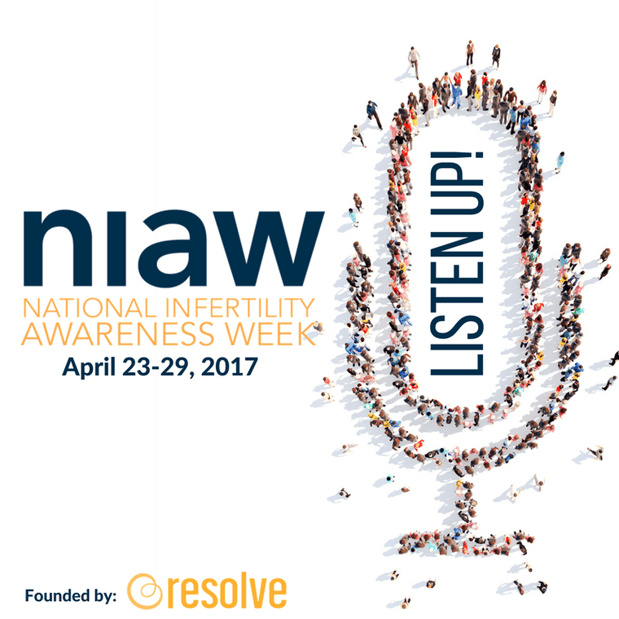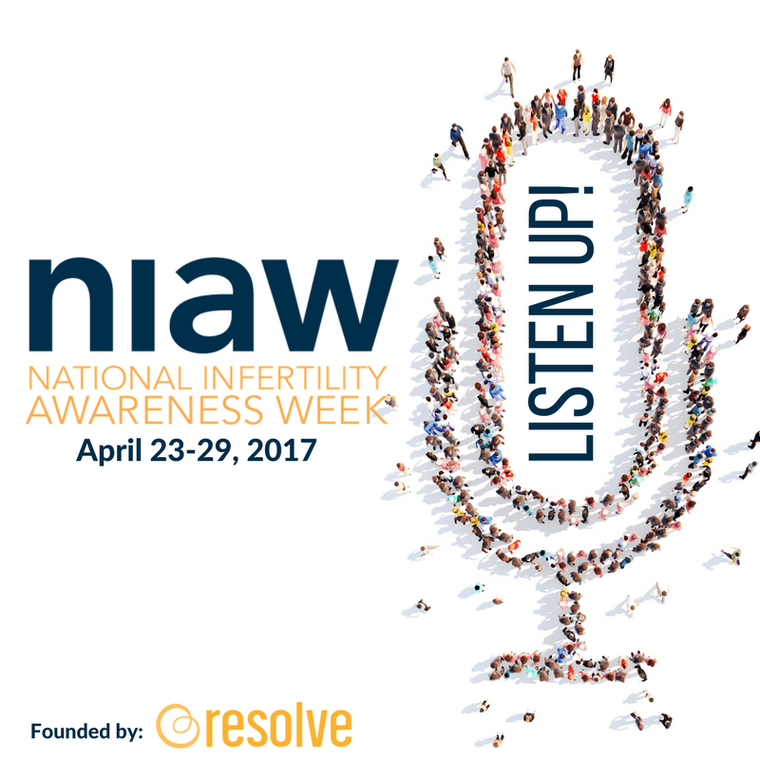 National Infertility Awareness Week (NIAW) is April 23 – 29, 2017. NIAW is sponsored by RESOLVE: The National Infertility Association. This year, RESOLVE wants you to “Listen Up!” when it comes to issues around infertility and family building. This public awareness campaign is created so anyone who cares about the infertility community can feel empowered to do something that makes a difference, either in your own family building journey or to help someone else.
National Infertility Awareness Week (NIAW) is April 23 – 29, 2017. NIAW is sponsored by RESOLVE: The National Infertility Association. This year, RESOLVE wants you to “Listen Up!” when it comes to issues around infertility and family building. This public awareness campaign is created so anyone who cares about the infertility community can feel empowered to do something that makes a difference, either in your own family building journey or to help someone else.
Infertility impacts millions of Americans and does not discriminate based on race, religion, socioeconomic status or sexuality. “Listen Up!” and become part of the movement.
We are posting the following information from RESOLVE’s website to help spread this message.
Infertility is a disease that results in the abnormal functioning of the male or female reproductive system. The World Health Organization, the American Society for Reproductive Medicine (ASRM), and the American College of Obstetricians and Gynecologists (ACOG) recognize infertility as a disease.
Infertility is defined as the inability to conceive after one year of unprotected intercourse (six months if the woman is over age 35) or the inability to carry a pregnancy to live birth.
- 4 million women, or 11.9% of women, have received any infertility services in their lifetime. (2006-2010 National Survey of Family Growth, CDC)
- 1 in 8 couples have trouble getting pregnant or sustaining a pregnancy. (2006-2010 National Survey of Family Growth, CDC)
- Approximately one-third of infertility is attributed to the female partner, one-third attributed to the male partner and one-third is caused by a combination of problems in both partners, or is unexplained. (asrm.org)
- A couple aged 29-33 with a normal functioning reproductive system has only a 20-25% chance of conceiving in any given month (National Women’s Health Resource Center). After six months of trying, 60% of couples will conceive without medical assistance. (Infertility As A Covered Benefit, William M. Mercer, 1997)
- Approximately 44% of women with infertility have sought medical assistance. Of those who seek medical intervention, approximately 65% give birth. (Infertility As A Covered Benefit, William M. Mercer, 1997)
- Approximately 85-90% of infertility cases are treated with drug therapy or surgical procedures. Fewer than 3% need advanced reproductive technologies like in vitro fertilization (IVF). (asrm.org)
- The most recently available statistics indicate the live birth rate per fresh non-donor embryo transfer is 47.7% if the woman is under 35 years of age and 39.2% if the woman is age 35-37. (Society for Assisted Reproductive Technology, 2013)
- Fifteen states have either an insurance mandate to offer or an insurance mandate to cover some level of infertility treatment. Eight of those states have an insurance mandate that requires qualified employers to include IVF coverage in their plans offered to their employees: Arkansas, Connecticut, Hawaii, Illinois, Maryland, Massachusetts, New Jersey, and Rhode Island.
- A study published in the New England Journal of Medicine (August 2002) found that the percentage of high-order pregnancies (those with three or more fetuses) was greater in states that did not require insurance coverage for IVF. The authors of the study noted that mandatory coverage is likely to yield better health outcomes for women and their infants since high-order births are associated with higher-risk pregnancies.
- The Affordable Care Act (ACA) does not require coverage for infertility treatments. Those states with an infertility mandate that covers IVF may have chosen an Essential Health Benefits (EHB) benchmark plan that includes the IVF mandate. The EHB impacts the individual and small group markets only in each state.
At InVia Fertility, we have been offering state-of-the-art fertility treatment services for the past 15 years. To see a fertility specialist who is a board-certified physician with excellent success rates, make an appointment at one of InVia’s four Chicago area fertility clinics.


 National Infertility Awareness Week (NIAW) is April 23 – 29, 2017. NIAW is sponsored by RESOLVE: The National Infertility Association. This year, RESOLVE wants you to “Listen Up!” when it comes to issues around infertility and family building. This public awareness campaign is created so anyone who cares about the infertility community can feel empowered to do something that makes a difference, either in your own family building journey or to help someone else.
National Infertility Awareness Week (NIAW) is April 23 – 29, 2017. NIAW is sponsored by RESOLVE: The National Infertility Association. This year, RESOLVE wants you to “Listen Up!” when it comes to issues around infertility and family building. This public awareness campaign is created so anyone who cares about the infertility community can feel empowered to do something that makes a difference, either in your own family building journey or to help someone else.
